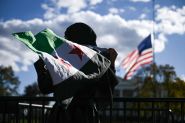- Home
- Middle East
- Who Is Mohammad Pakpour, Iran's New Commander of the Islamic Revolutionary Guard Corps?
Iran’s Supreme Leader Ayatollah Ali Khamenei has appointed Mohammad Pakpour as the new commander of the Islamic Revolutionary Guard Corps (IRGC), replacing Hossein Salami who was killed in targeted Israeli strikes on Friday. The decision underscores Pakpour’s entrenched role within the Iranian military establishment and his alignment with the regime’s broader strategic objectives.
Domestic Roles
Pakpour has led the IRGC Ground Forces since 2010, which marked him as a key figure in the development of Iran’s military operations. His strategy focused on modernizing the force, showcasing technologies like the Hemaseh drone, and promoting military readiness through specialized exercises.
His military career began during the Islamic Revolution in the Kurdistan Province, where he was active in the early years of the IRGC. Domestically, he has also been involved in operations in Iran’s northwest and initiatives aimed at “stabilizing” the southeast.
Reports indicate that the IRGC Ground Forces employed lethal force during the November 2019 protests in Iran, resulting in harm to unarmed demonstrators and civilians across multiple cities.
Regional Operations and Strategy
Pakpour has played a significant role in Iran’s regional military policies, particularly in Syria and Iraq, where his role has supported Tehran’s broader ambitions.
Pakpour served as a commander in the 1980-1988 Iran-Iraq War. He also held significant roles such as leading the 8th Najaf Division, the 31st Ashura Division, and overseeing the Army’s Northern Command Headquarters.
According to the Counter Extremism Project, an NGO that combats extremist groups, the IRGC Ground Forces have also backed the Quds Force in training and equipping forces loyal to former Syrian President Bashar al-Assad. These efforts have been a cornerstone of Iran’s strategy to extend its influence in the region, with Pakpour emphasizing the importance of maintaining a presence in Syria at the request of the Syrian regime at the time.
His involvement highlights the Quds Force’s central role in supporting Iran-aligned groups and proxies.
Educational Background
Pakpour holds a PhD in Political Geography from Tehran University, which has shaped his approach to military operations and security strategies. His academic background has been instrumental in framing his initiatives.
International Tensions and Sanctions
Pakpour’s tenure has been closely tied to the IRGC’s controversial activities, which have drawn significant international attention.
Following Iran’s downing of a US drone in 2019, Pakpour publicly emphasized Iran’s regional strength, framing it as a response to renewed US sanctions targeting the country’s nuclear program, according to the Counter Extremism Project.
His involvement with the IRGC has led to widespread sanctions. The United States sanctioned him in 2019 alongside other IRGC officials. Sanctions from the European Union, Australia, Japan, and Canada have also targeted him for his role within the IRGC and its broader activities. These sanctions, lifted briefly under the 2015 nuclear deal, were reimposed after the US pulled out of the agreement.
The IRGC’s designation as a Foreign Terrorist Organization by the US in April 2019 has further escalated scrutiny of Pakpour’s leadership. His appointment comes at a time when tensions in the region have intensified, following Israeli airstrikes targeting Iranian military and nuclear sites.
As Iran faces growing international pressure and domestic economic difficulties, Pakpour’s tenure will likely focus on reinforcing the IRGC’s role in securing the regime’s interests at home and abroad.
Read more



Comments